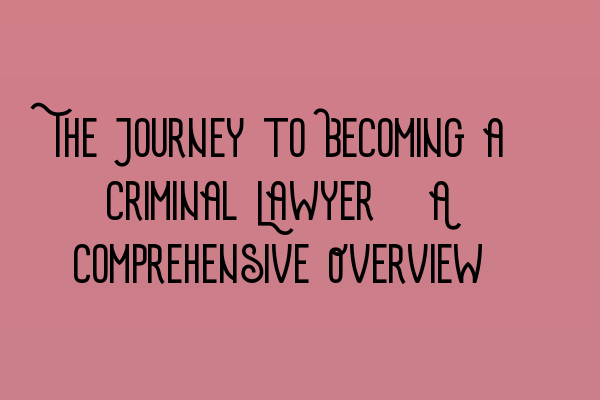The Journey to Becoming a Criminal Lawyer: A Comprehensive Overview
Are you interested in pursuing a career in criminal law? Becoming a criminal lawyer is a rewarding and challenging path that requires dedication, hard work, and a strong knowledge of the legal system. In this comprehensive overview, we will guide you through the journey of becoming a criminal lawyer from start to finish.
Step 1: Education and Qualifications
The first step towards becoming a criminal lawyer is obtaining the necessary education and qualifications. A law degree is typically required, followed by completion of the Solicitors Qualifying Examination (SQE) 1 and SQE 2. The SQE 1 tests your legal knowledge and understanding, while the SQE 2 evaluates your legal skills.
If you are preparing for the SQE 1 exam, we recommend practicing with SQE 1 Practice Exam Questions and taking SQE 1 Practice Mocks FLK1 FLK2 to familiarize yourself with the format and content. Additionally, consider enrolling in SQE 1 Preparation Courses to enhance your knowledge and boost your chances of success.
After passing the SQE exams, you will need to gain practical work experience through a training contract or apprenticeship to fully qualify as a solicitor. This practical experience is invaluable in developing the skills and expertise necessary for a successful career in criminal law.
Step 2: Building Your Skills and Expertise
As a criminal lawyer, it is essential to continuously build and refine your skills and expertise. This can be achieved through ongoing professional development courses and attending relevant legal conferences and seminars. Additionally, staying updated with the latest changes and developments in criminal law is crucial to providing effective representation to your clients.
To enhance your skills and knowledge, you may consider enrolling in SQE 2 Preparation Courses that focus specifically on criminal law. These courses provide comprehensive training and preparation for the SQE 2 exam, covering topics such as case analysis, advocacy, and legal research.
Step 3: Gaining Experience in Criminal Law
Once you have completed your education and obtained the necessary qualifications, gaining practical experience in criminal law is essential. This can be done by working in a law firm that specializes in criminal defense or by joining a legal aid organization. The experience you gain will help you develop a deep understanding of criminal law procedures, courtroom dynamics, and the complexities of criminal cases.
Step 4: Establishing Your Reputation
Building a strong reputation as a criminal lawyer is crucial for attracting clients and expanding your practice. It is essential to provide excellent legal representation, demonstrate integrity, and maintain a professional demeanor at all times. Word-of-mouth recommendations and positive client testimonials are powerful tools for establishing your reputation in the legal community.
Step 5: Continuing Professional Development
As a criminal lawyer, it is important to stay updated with the latest legal developments and continuously improve your skills. Continuing professional development (CPD) programs offer opportunities to expand your knowledge and stay abreast of changes in criminal law. By participating in relevant CPD activities, you can enhance your expertise and maintain your professional standards.
Conclusion
The journey to becoming a criminal lawyer requires dedication, perseverance, and a commitment to lifelong learning. By obtaining the necessary education, qualifications, and practical experience, as well as continually improving your skills, you can establish a successful career in criminal law. Remember to stay updated with the latest legal developments and consider enrolling in relevant training courses or programs to enhance your knowledge and improve your chances of success.
